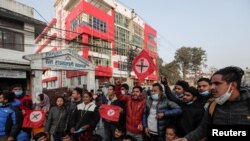Nepal’s Cabinet recommended dissolving parliament in an emergency meeting on Sunday, with an aide to Prime Minister K.P. Sharma Oli saying he wants to seek a fresh mandate in a general election after losing support from his own party.
Oli, who led an alliance with former Maoist rebels to a landslide victory in 2017, has faced criticism for sidelining his Nepal Communist Party and working through a small coterie of supporters.
“The prime minister has lost the majority in the parliamentary party, central committee and the secretariat of the party,” said Bishnu Rijal, a member of the party’s central committee.
“Instead of seeking a compromise within the party he chose to dissolve parliament.”
Oli aide Rajan Bhattarai said the prime minister had made the move due to the backlash against him from his party, which had also asked him to consider quitting as its president.
“So he decided to face the people in an election,” Bhattarai told Reuters. “This is the best way in a democracy.”
The next general election had been due in 2022. It was not immediately clear when a snap election would be called if, as expected, Nepal’s president accepts the cabinet request.
Opposition lawmaker Gagan Thapa of the Nepali Congress said on Twitter the cabinet decision was “unconstitutional and undemocratic.” He did not explain.
After his 2017 win, Oli had vowed to fight corruption and poverty but made little progress, especially as the COVID-19 pandemic hammered the poor Himalayan country’s tourism-dependent economy.
Infections of the virus that causes the disease have reached 253,184 with 1,777 COVID-19 deaths in the country of 30 million people.
Sandwiched between China and India, Nepal is also influenced by the priorities of the giant neighbors keen on expanding their say in the strategically placed country.





